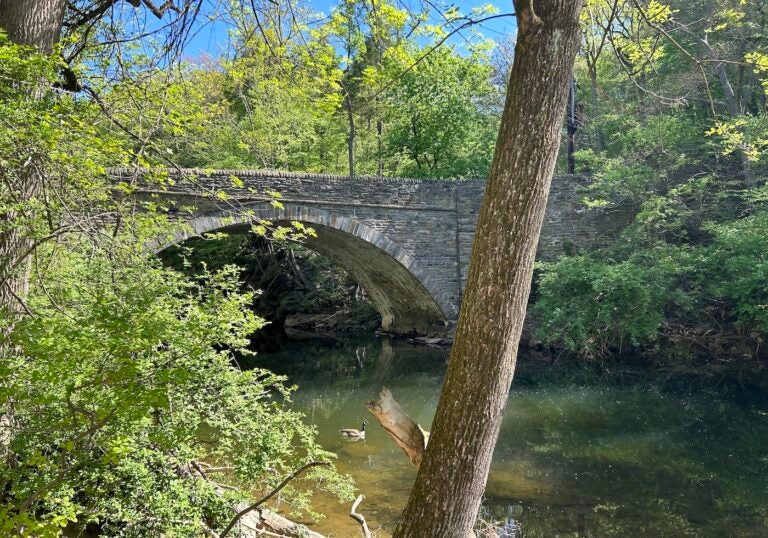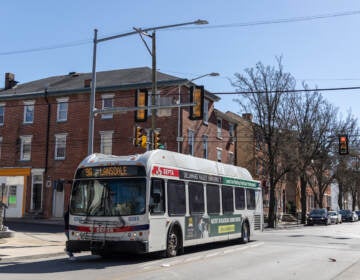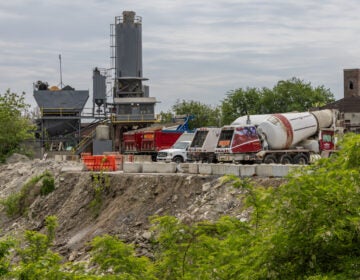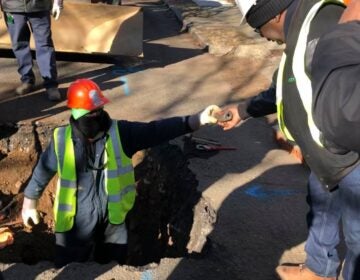Federal money will help prepare 2 Philly bridges for climate-driven floods
The funding will go toward renovations of the Valley Green Road Bridge in Wissahickon Valley Park and the Bells Mill Bridge near Morris Arboretum.

Valley Green Road Bridge in Wissahickon Valley Park is one of two bridges being renovated with federal infrastructure resilience money. (Sophia Schmidt/WHYY)
Have a question about Philly’s neighborhoods or the systems that shape them? PlanPhilly reporters want to hear from you! Ask us a question or send us a story idea you think we should cover.
Federal money is coming to Philadelphia to rebuild two bridges over the Wissahickon Creek in Northwest Philly to help them withstand the pressures of traffic and increased flooding.
The projects are part of a nationwide grant program to shore up roads and bridges against the impacts of human-caused climate change.
“Whether it’s the fury of floods, or now unsustainable precipitation patterns, drought parching the west, wildfires — we see the risks … across the country,” said National Climate Advisor Ali Zaidi during a press event in Northwest Philly Wednesday. “The good news is that we know how to … build the infrastructure we need to keep people safe.”
The Promoting Resilient Operations for Transformative, Efficient, and Cost-Saving Transportation, or PROTECT grant program, has awarded over $829 million to projects across 37 states over the last two fiscal years. It’s funded through the Bipartisan Infrastructure Law.
Pennsylvania is receiving two grants. More than $14 million will go to the city of Philadelphia for the renovation of the Valley Green Road Bridge in Wissahickon Valley Park and the Bells Mill Bridge near Morris Arboretum, both of which were built in the 1800s and are in “poor condition,” according to city officials. PennDOT will also receive over $6 million to increase the height of a floodwall in downtown Pittsburgh that stops the Monongahela River from flooding I-376.
Delaware will get over $15 million to elevate Route 9, where it crosses Blackbird Creek near Townsend. Higher water levels in the area due to sea level rise disrupt travel on the road “daily,” according to the U.S. Department of Transportation.
New Jersey is not receiving any money in the first round of grants.
In the northeastern United States, increased flood risk is among the biggest impacts of climate change. Heavy rain is becoming more frequent and intense, and sea level rise is causing more sunny-day flooding in coastal areas.
The bridges in Northwest Philly will be renovated to replace the scrap rock and rubble inside with concrete and shore up abutments, said Mike Carroll, deputy managing director of the city’s Office of Transportation and Infrastructure Systems. They’ll end up looking about the same, but will be more resilient to traffic and flooding.
“The force of water that’s rushing past the bridge is going to start to scour the abutments. … It’s going to take some of the mortar that’s keeping the rocks together away,” Carroll said. “Any given storm isn’t necessarily going to create a collapse or a catastrophic event. But storm after storm, you run that risk, and that risk increases as the intensity of storms, the intensity of floods, the frequency also goes up. We need to get ahead of that, because we know … that’s unfortunately our future.”
Construction will last around two years, following a two-year design period, Carroll said.
The Bells Mill Road Bridge is considered a critical route for a nearby hospital, said Federal Highway Administrator Shailen Bhatt.
“Imagine we had a hurricane or — actually you don’t even need a hurricane anymore — a bad Nor’easter that just parks itself over this area, [with] a lot of precipitation. Now you’ve got a major commuter route into a hospital that is being affected,” he said. “So rather than wait until a really bad rain storm or hurricane washes out these bridges and now we have to come back and build them in an emergency setting, we’re saying let’s reconstruct them.”
Other grants throughout the country address climate impacts other than flooding. Davis, California, is receiving money to install cool pavement to combat extreme heat, and the Ewiiaapaayp Band of Kumeyaay Indians in California is receiving funds to create a secondary evacuation route for wildfires.

Get daily updates from WHYY News!
WHYY is your source for fact-based, in-depth journalism and information. As a nonprofit organization, we rely on financial support from readers like you. Please give today.








